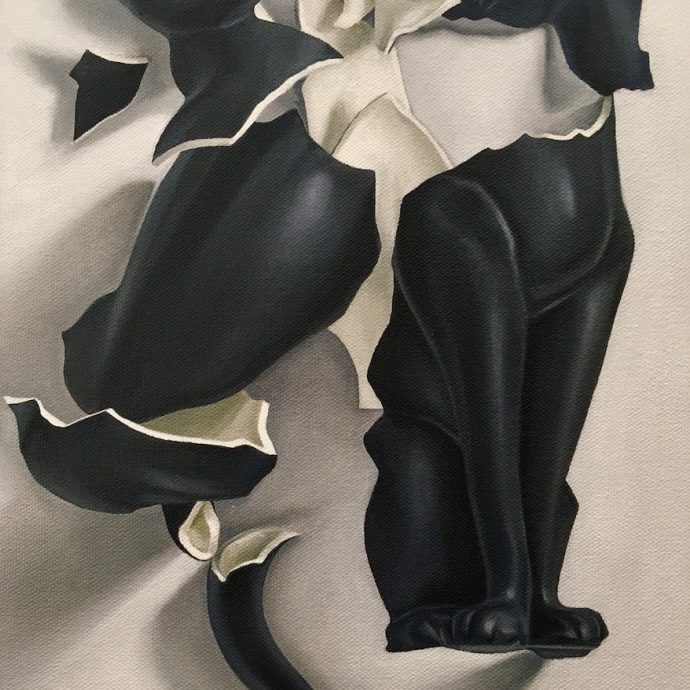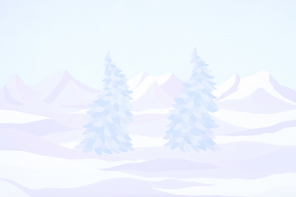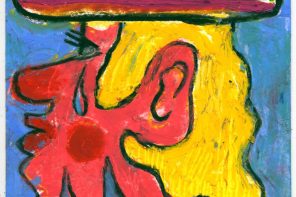I’m the first to emerge from the pink ice, though it was supposed to happen at the same time. “Slight variation is normal,” the technician tells me, hands me a heated, blush colored towel to wrap around my head. “Height, weight, depth of anger, season, all of these are factors.” After fifteen minutes in the sauna, I am sent home to settle back into our life, to start packing for the move, to wait for them to call and say you are ready.
Our house looks the same as we left it. Sink a reeking mouth of dirty dishes. Coffee mugs on every surface as if to catch impending leaks. Tilting towers of books on the kitchen table, where you’d work while I cooked dinner. My body is still stiff, so I inch from room to room, picking things up, putting them down in slow motion. Your Skeleton Witch t-shirt that still smells like you, like garlic and cigar smoke. My half-full Natty Light can. A pizza box with our uneaten crusts inside like ragged slivers of moon. A small, warm flower blooms in my chest. Again, I will be stuck with the cleaning. I breath in and out quick, like the technician instructed “should a flare up occur,” but the bloom persists, spreads, combines with the second anger that after all of this I am already angry again.
Outside, the city is hard blue skies and lush greens. At noon each day, I take a long walk around the neighborhood as recommended, the streets quieter than I remember, the live oaks latticing the light. My body loosens more each day, seems to stretch out, to expand. I think of my sprained right ankle during high school soccer, how when the brace came off it always took me a while to trust the joint again. I think of a half-frozen chicken under the tap, the pale bird only ever in my hands because you fear salmonella. I think how it is good I came out first. You will need me to talk you through all this, to reassure you that your aches are normal, that your body isn’t coming apart.
After three days, I’m worried and return to the facility, a large medical building made of black glass on the edge of the city. “He’s still in process,” they tell me at the front desk, like you are a package I’m tracking. But a nurse in a cotton candy pink uniform, young enough to be my student, leads me down a narrow hallway to your examination room, stands aside to reveal your block, which is huge; you are tall and we’ve both put on weight since we moved here. Silver space heaters whir in the corners. Through the rose-gold pink, translucent layers, I can make out your dark, curly hair, your knockoff Doc Martins, your faded black jeans, the blurred red circle of your face. We were unconscious when they froze us in our regular clothes, lying down, “two Snow Whites” one of the nurses joked, but now you look like you were running from something. I place my hand near where your shoulder must be, tell you I miss you like I think I should, like the girlfriend in a science fiction movie would. I close my eyes.
Before the pink ice, we’d stopped touching. I was teaching six composition classes a semester at a small college, a temporary instructor, and you’d found nothing. Instead of applying for other work, you said “I’ll try again in a few months,” drafted your novel, RPGed the afternoons. “At least one of us can write, I guess,” I said, smiling, my resentment a hot glass marble I held carefully in my mouth, moving it back and forth, savoring it like a rare candy. At the end of a work day, voice frayed, a heavy bag of ungraded essays over my shoulder, I seethed at your fresh pages, at the waiting housework for two.
I didn’t want to be like my mother, who my father called “the tornado” for how she threw her daughter’s porcelain animal figurines, her school science project, her father’s favorite records, the oldest potted plants, everything tender and delicate swept up in the hot, circling winds of her anger. Instead of complaining, or asking you to help, I’d drink a beer, then another, start dinner. After a week or two, I’d stop cooking and cleaning, make us frozen pizza, go to bed alone while you worked. My body would hunch, my legs turn cement heavy. Then one day, my hair would become spines of flame, my voice river fire singing the walls black. Our plastic poster frames, our sixties retro clock, our blow-up swan chair would all melt and warp, our house would become a kitsch Dali.
“Calm the fuck down, I don’t understand why you’re shouting,” you’d shout, your words hot coals blazing through the thick air. “I can’t be around you when you’re like this,” you’d say, slamming a door so volcanic heat poured from the sound. Then you’d put on an album, turn it up loud and I’d run into the shower, lock the door, snuff myself out in my own cold rain.
Eventually, we would open windows, clear debris, go for solitary drives. We would look at each other through the seared mess. “I’m sorry,” we’d both say, though secretly I thought you were more wrong. “I know you’re depressed, that you’re trying. I’m glad you can write through it,” I lied.
“You need to write, too. I’m sorry, it’s not fair, I’ll do more. Please just tell me when you’re starting to get upset.”
Then you’d gift me a book of stories I’d mentioned wanting, the wrapping paper a collage you made yourself, all my favorite fairy-tale witches glued on the local paper, a picture of an anatomical human heart in the center, “I’m sorry,” sharpied on the sides.
For shorter and shorter stretches of time, we’d live in comfortable cool. Evenings we’d read on opposite couches you’d cleared of your Monster energy drinks, sip chilled, cheap shiraz, devour credit card prosciutto. Weekends we’d splurge at our favorite restaurant, consume bowls of the spicy seafood stew unique to our city, then a main course of crab and shrimp tossed in béchamel. After we’d go to a concert at a grimy dive, lean into each other beneath guitar riffs like claws on mirrors, the anger outside us, someone else’s for once. At night, our sheets were freshly washed and smooth.
Then you’d forget some small task, then another. I’d bend and scrub and make my face beam. Soon my mouth would taste like matches. You’d describe a new scene you’d written and I’d say, “Eh, sounds kind of stock,” though I hadn’t been listening. Our books and clothes all smelled of cigarette smoke, as if remembering our last fight. Pages turned to ashes in our hands. Every meal was scorched. Our sex was quick and mean, our bodies hot and sore and unsatisfied. When the novel I’d never read sold and you were offered the plush gig far away, three times what I make, half the work, I bought you a bottle of sweet, pink wine I knew you’d hate. When you made a face, I smashed it on the floor.
This was in late May; in August we’d move. Two months free. Two months to decide what to leave and what to take. Two months to decide if I’d go with you or stay, though neither of us would say this. The pink ice was a new therapy: minimum two months and it promised to clear out our past resentments, return us to an earlier form of loving each other, of loving ourselves. Something about how the heart responds when it thinks it is freezing to death. Something about the pink ice specifically, its healing qualities.
“That’s some bullshit. They just want to market it to women,” my women friends said over the phone, in other cities where we must have been happier. “Your father keeps wanting me to do that. I tell him to fuck off. Let him become Encino Man,” my mother said.
“Eh, I know it’s garbage, but it’s no more garbage than anything else,” I told them.
Of course, what we needed was therapy. But we’d decided we were too intricate for that. We’d halogened too many midnights squinting at thin-paged anthologies, memorized too many literary histories, passed too many arduous tests. This method was physical, tangible. No more dangerous, the website said, than sensory deprivation tanks. I paid the last of our meagre savings. Three days later, we received a thick, rose gold packet in the mail. We followed the preparation instructions to the letter: three days with no perfume or lotion or soap, two days without food or alcohol, the last day without water. By the time we walked into our separate, chilled compartments, we felt feral and virtuous, empty and clean, as if purified for some great spiritual undertaking.
I’m supposed to be filling our old liquor store boxes with books, but mostly I drink black coffee, steaming hot, call women friends I haven’t talked to in years. My voice is rusty at first, as if pink ice surrounds my vocal chords, but eventually it becomes louder, steadier, surer than ever before. I ask about their lives, their work, their hearts, and they tell me. I gush about the food in this city, about the new record I bought with your credit card, listened to on the dusty floor like a teenager, my warming body starred. I make plans for visits, for vacations in other states. When they ask about you, I flush with shame, change the subject to how I’m writing again in a cheap spiral, hand written journal entries that go nowhere but feel hot in the right way.
What I can’t explain: how each entry burns backward, to a girl I thought I’d lost. She is muscled and witty and strange, loves Phyllis Diller and gruesome stories, plays a decent left midfield. Her closet is full of notebooks, pages curling with wolves and haunted houses and crowns. As I write she makes cuts inside me, shards of hot ice breaking through. Her words are swallowed sparklers. She says things about you, about us, about what I have become in this house, that make me want to go back into the block, feel my heart slow again.
I tell her about the last fight, how after, you bought me the expensive, first edition copy of my favorite author’s new book, the one that comes in a special cloth lined box, the stories unfurling in accordion pages thick as cream. I tell her about your grandfather’s red gravy, how you spent all day cooking it while I took my exams, how it was ready for me when I got home, poured over spaghetti in a deep blue bowl.
I tell her I might never meet anyone else.
She listens and she puts her arm around me, and then she laughs. She says she noticed, that day in the pink waiting room, that it was mostly women biting their bottom lips, women with coffee stained clothes and dark circles under their eyes, women sighing and then yelling into their phones, yelling about what was taken from them, what was not given, women grieving their lost, fresh pages.
“Well, he’s going to do it too,” I had assured my friends. “He’s not that kind of guy.”
Now I write outside, on the front porch steps, grateful you’re not back yet. The concrete’s heat soaks into my still-cold thighs. I think maybe kicking a ball again would warm them faster, feel an old longing crackle in my feet.
When my hand cramps and I’m too hot to think, I slip back inside, take my clothes off and drift through the house in a daze. There are still places on my body where a thin layer of pink ice remains, glinting in patches of sunlight. A brushstroke down my thighs. A thin lace behind my knees. A sliver along the small of my back. All the places I love to be kissed, places your mouth hasn’t savored in years.
I recline on the couch, touch and touch. My last ice cracks apart beneath my fingers, falls away with a delicious sting. As I’m falling asleep, I imagine the whole city coated, a pink glaze on the thick, curving arms of the live oaks, on the wide, flat leaves of palms, on the surface of the winding bayou behind what is still our house. The sun rises, purple-pink, and the ice fissures in patterns like constellations, like maps of cities I’ve never seen, gives way to what is pungent and muddy and rich.
This is the dream I’m having when you walk in. I don’t know how long it’s been, or remember getting any call. I don’t know how you got home. I grab a blanket and cover myself, my blush a deeper pink than the layer that still obscures your face. Around me, the unfilled boxes gape, all the brands we drank too much of beckoning future. You sit across from me with the stiffness of the Tin Man. Many weeks of cold still encase you, an astronaut’s suit fractured only at your joints. “Are you in pain?” I ask, a lukewarm feeling, a new, tepid cruelty rising in my chest.
Your lips move but the words don’t reach me. You lean back, rest your hands on your knees with great effort. It is an overcast day, the beginnings of a storm gathering above us, one that won’t spawn tornadoes but will still rip shingles from our roof, create real leaks. For a moment, though, the clouds break and afternoon light slices through our black curtains, falls on your shoulders, your chest, the acne scarred place between your chin and your neck where I once placed my lips. You shine, your face pink rivulets, the blue stones of your eyes coming clearer.
You are looking at me in the old way and also with a new fear. Your arms rise as if to hold me, fall back beside you. The air in the room sharpens with winter. And if I was still in love, I would wrap myself around you, give you some of my heat. I would say, it’s alright, baby, I’m right here, you don’t have to be afraid.
Meagan Cass’s first full-length collection, ActivAmerica, won the Katherine Anne Porter Prize in Short Fiction, judged by Claire Vaye Watkins, and was published in November 2017 by UNT Press. She is author of the chapbook Range of Motion (Magic Helicopter Press), and her stories have appeared in Hayden’s Ferry Review, DIAGRAM, Joyland, and Puerto del Sol, among other places. Based in St. Louis, she teaches at University of Illinois Springfield and serves as an assistant editor for Sundress Publications, where she is co-managing editor of Craft Chaps.



